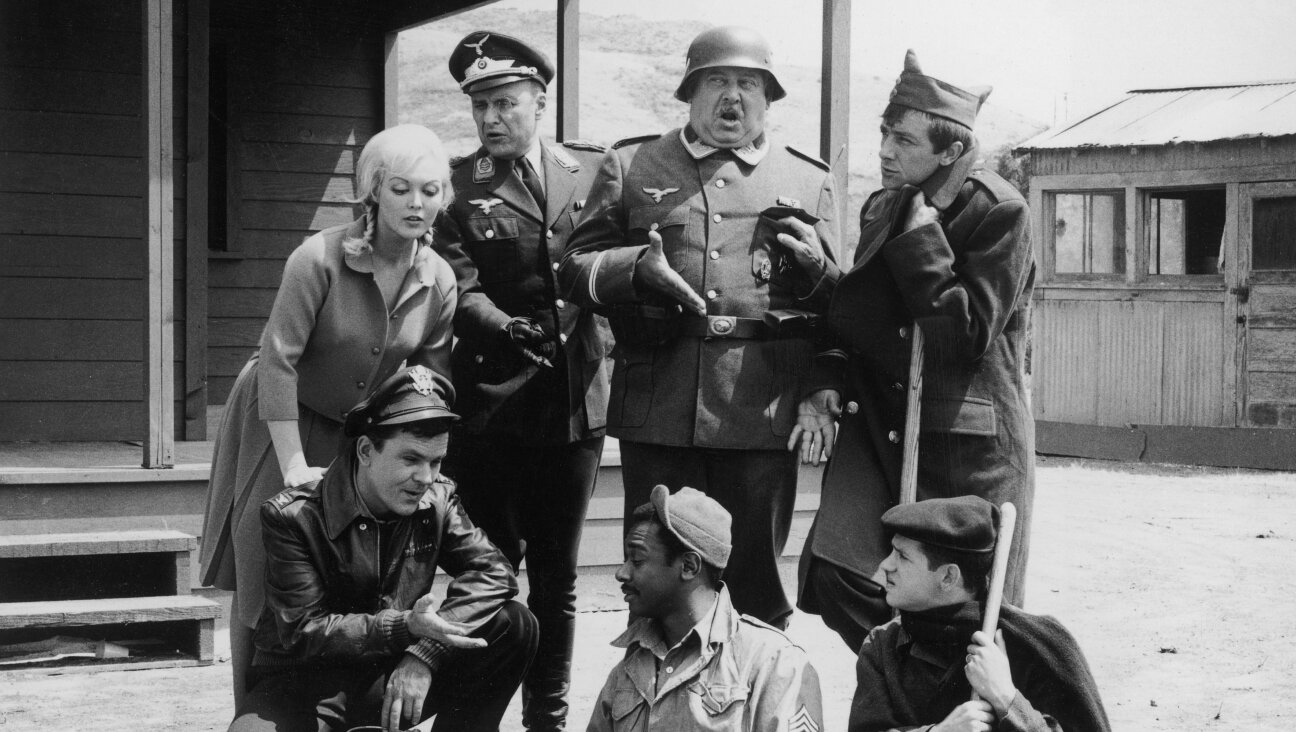‘Scaffolding’ Shows Another Side Of Israeli Masculinity

Asher Lax as “Asher” in “Scaffolding” by Matan Yair. Image by Courtesy of Breaking Glass Films
This weekend much of America was interrogating questions of masculinity. Following Brett Kavanaugh’s explosive display at his Senate hearings on Thursday, when toxic masculinity and male privilege seized the dais, many men and women are scrambling to find a suitable, constructive alternative. Writer-director Matan Yair’s debut feature film, “Scaffolding,” which premiered in New York September 28, presents one.
Asher Lax (played by a newcomer with the same name) is a troubled Israeli youth. He’s disruptive in class, regularly gets into fights with other students and has little regard for his high school hierarchy. At school, he barges into the teachers’ lounge, calls a test proctor a “bitch” and has no problem derailing the format of his special needs classroom by demanding to know the ending of Sophocles’ “Antigone” before his peers have finished reading it aloud.
But if Asher is often obliged and encouraged by his literature teacher Rami (Ami Smolartchik), his father Milo (Yaacov Cohen) is harder on him. Milo owns a scaffolding business where Asher spends his time off from school. He’s expected to run the business while his father recovers from surgery and to inherit it when he retires. Asher does the work, but is dreaming a little bigger, studying for his matriculation exams and trying to impress Rami by handing in an assignment for another class, questions written for his father, based on a list poem by the artist Karl Haendel.
Rami sees that Asher’s quick to get angry and tells him to try not to be “so prickly,” a piece of advice that leads Asher to a well-earned moment of introspection. Asher wants to remake himself, to be better, more sensitive and less aggressive but continues to see weakness in vulnerability. His father, teaching him to count out money, tells him that literature is dead because the poet Shaul Tchernichovsky is on the 50 shekel note.
Juggling two role models — a scrawny, nervous teacher with a love of poetry and a garrulous but rough-necked father — Asher tries to split the difference, reading on construction sites. When Milo discovers he’s studying, it doesn’t go well and when his relationship with Rami reaches a crisis point, Asher lets his impulses take control in a series of bad decisions.
Asher is a familiar archetype in high schools the world over – a poorly behaved kid with a learning disability and an aversion to authority – but one not often seen with this much specificity on screen. He wants to succeed but doesn’t know how, and the inner logic of his rows with classmates and teachers are sometimes a mystery even to himself. The vérité, hand-held camera style of the film signals just how disoriented Asher is. He’s not a willful rebel or a deliberate troublemaker; he’s someone who doesn’t seem to be aware that the conventions he’s challenging exist. What makes “Scaffolding” effective are its small stakes and the drift of its focus, which mimics Asher’s behavior as he decides what kind of man he wants to be.
The film presents two options for Asher: He can follow his father into business or try to pursue higher education. But “Scaffolding” understands that Asher taking his studies further is something of a false choice. He has trouble reading and lacks the rigor needed to succeed beyond high school, where he is a poor student. Outside school and work, he has other things holding him back.
Asher is found at a party, getting distracted at a soccer game or tailgating a girl he likes as she takes her driver’s test. He indulges in stalking, brawls and even breaking and entering as he tries and fails to figure himself out. He’s rudderless and there’s an unexplored subtext throughout — though one known to those familiar with Israel — that before the 17-year-old can move on with his life in any direction, he must first serve in the IDF: A post we sense he’s not ready for.
In the end, Asher tries to find proof of Rami’s approval. He’s disappointed to discover, instead, something he views as fragility in the man who encouraged his learning. But the discovery leads him to wonder about the nature of being a man.
Later, sitting by his father, who eats silently in the car, Asher asks him: “How is it you’re so strong in my life?” The question, one of many he asks, goes unanswered. For the first time in the film, the father-son dynamic shifts. Asher’s open inquiry, learned from Rami, bests Milo’s stoicism. The questions hang in the air, waiting for an honest response.
PJ Grisar is the Forward’s culture intern. He can be reached at [email protected].
A message from our Publisher & CEO Rachel Fishman Feddersen

I hope you appreciated this article. Before you go, I’d like to ask you to please support the Forward’s award-winning, nonprofit journalism during this critical time.
We’ve set a goal to raise $260,000 by December 31. That’s an ambitious goal, but one that will give us the resources we need to invest in the high quality news, opinion, analysis and cultural coverage that isn’t available anywhere else.
If you feel inspired to make an impact, now is the time to give something back. Join us as a member at your most generous level.
— Rachel Fishman Feddersen, Publisher and CEO
























